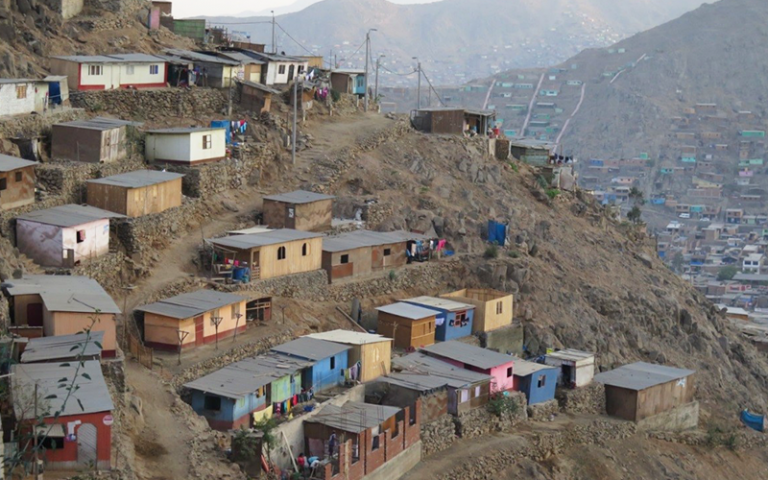Helping cities in the Global South manage different types of risk
The Bartlett Development Planning Unit (DPU) at UCL has led research partnerships with cities in the Global South to manage risk and create fairer, more sustainable and climate-resilient environments.

29 April 2022
Most of the world’s future urban growth is set to occur in the Global South, where capacity to plan and manage equitable and climate resilient development is limited. These pressures can create ‘risk traps’. Risk traps occur when daily health hazards like poor access to water, sanitation or food meet with episodic threats such as flood or fires, in environments where capacity to manage these risks is limited.
Through two projects (ReMapLima and cLIMA sin Riesgo) Professor Adriana Allen and Dr Rita Lambert from the UCL DPU investigated risk trap causes and management in Lima, Peru. A further project in Freetown, Sierra Leone and Karonga, Malawi saw Professor Allen collaborate with Dr Cassidy Johnson and Dr Emmanuel Osuteye (also from the DPU), to examine how ‘risk traps’ work and can be disrupted across urban Africa. This was part of an ambitious research programme led by Professor Mark Pelling at King’s College London.
Partnering with local communities
Across the three projects, the researchers teamed up with local communities, combining local knowledge with technical expertise and using drones, 3D modelling and mapping technologies to create maps exposing the everyday and episodic hazards faced by poor women and men, where these are located, and how they are produced.
They used the ReMapRisk tool to explore risk accumulation in informal settlements. This tool visualises risk trends to help local communities and policymakers understand the everyday risks and episodic hazards faced by the urban poor. Users can interrogate the platform to identify and prioritise strategic risk reduction and prevention measures.
Dealing with risk in practice
This research has equipped local policymakers and communities across the three cities with an increased capacity to deal with risk traps, while challenging fragmented and exclusionary city governance practices. For example in Lima, during the COVID-19 pandemic, local authorities and communities used ReMapLima to identify the most vulnerable groups and to target health and food emergency support to those most at risk, via community-appointed ‘local guardians’.
In all three cities, the mapping and risk monitoring systems translated into community projects, for example creating new public safe spaces in Lima’s historic centre to reduce young adult vulnerability and new organic allotments and vermiculture technologies to tackle food insecurity.
Under Urban ARK, community-based action planning provided the evidence to bring benefits to around 72,000 people in Karonga/Mzuzu, significantly reducing the risks of waterborne diseases such as cholera and making potable water accessible to local communities.
In Freetown, around 140,000 residents of informal settlements benefited from risk-preventing measures to confront flooding, landslides and housing collapse as well as upgraded drainage and sewage infrastructure.
A solid legacy in risk-reduction and climate-adaptation
The development of Disaster Risk Reduction (DRR) observatories and community-led DRMCs has helped to reframe public debates, public funding and policy-making, and created new alliances, and the underpinning research has provided evidence to drive policy and attitudinal change, opening debate on issues of heritage conservation, relocation and climate-change adaptation between residents and decision-makers.
In both Freetown and Karonga, the Disaster Risk Management Committees (DRMCs) established through Urban ARK are now the most decentralised governance structures dealing with risk reduction and prevention with systematic inputs from local communities.
Together, the work conducted by Professor Allen, her colleagues and partners has created a solid legacy to instigate locally relevant and socially sensitive risk-reduction and climate-adaptation investments at various scales to support strategic community-led action across the urban Global South now and into the future.
Research synopsis
Cities beyond risk: Disrupting risk accumulation through enhanced local capacities across the Global South
Research partnerships led by The Bartlett Development Planning Unit (DPU) with local communities and policy makers in Lima (Peru), Karonga (Malawi) and Freetown (Sierra Leone have improved governance instruments for fairer, more sustainable and climate resilient outcomes. This has helped cities in the Global South to avoid – and alleviate the effects of – urban ‘risk traps’.
Research team: Professor Adriana Allen, Dr Cassidy Johnson, Dr Emmanuel Osuteye and Dr Rita Lambert
Links
- Professor Adriana Allen’s academic profile
- Dr Rita Lambert’s academic profile
- Dr Cassidy Johnson’s academic profile
- Dr Emmanuel Osuteye’s academic profile
- The Bartlett Development Planning Unit (DPU) at UCL
- The Bartlett, UCL Faculty of the Built Environment
- The Bartlett REF 2021
Image
- Image credit: Adriana Allen
 Close
Close

